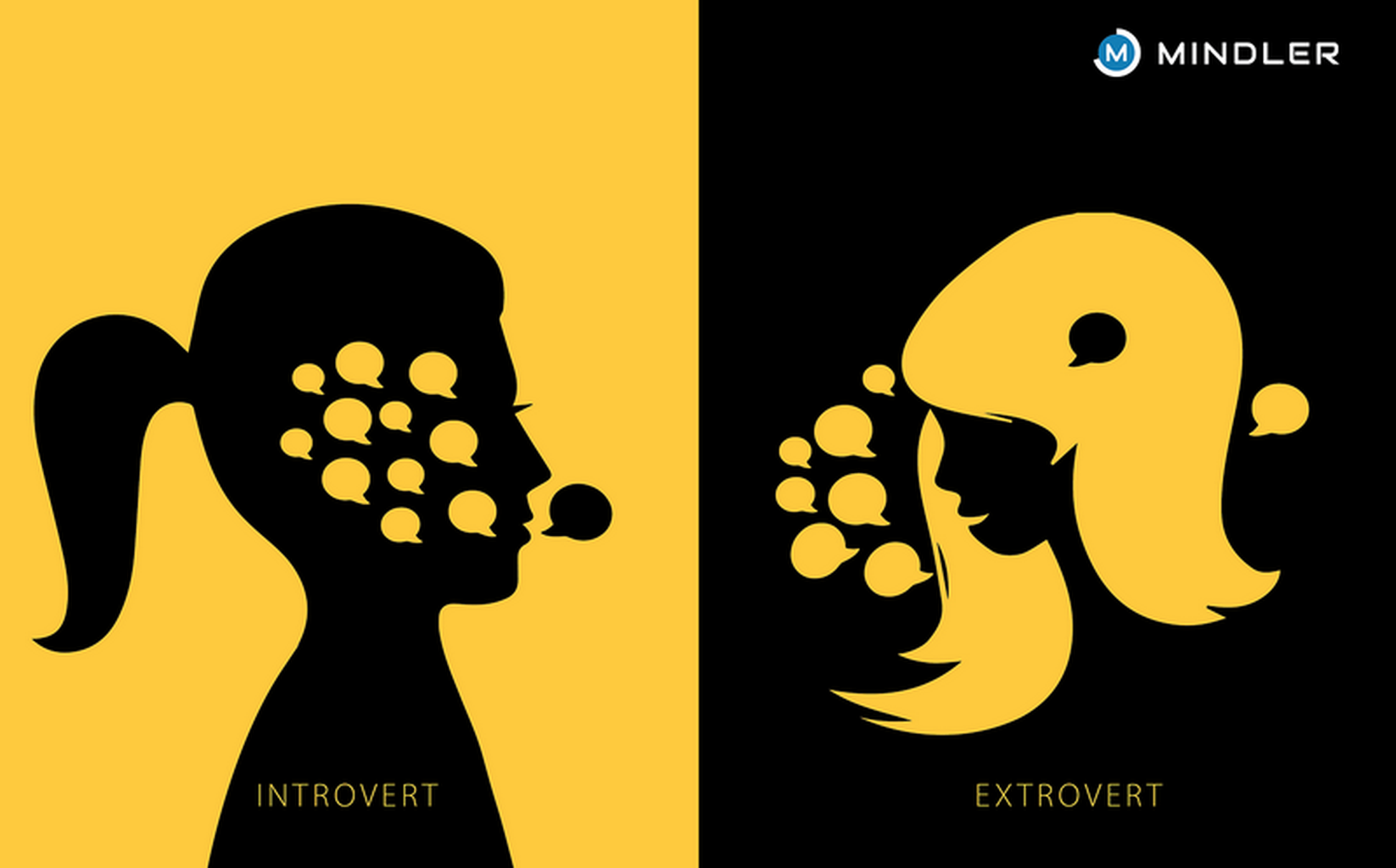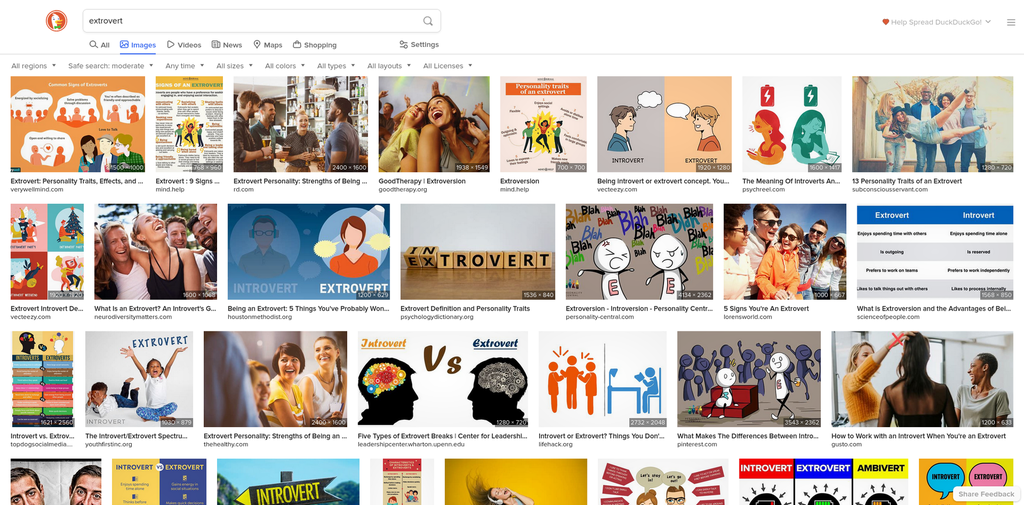What Really is an Extrovert?
An article about the definition of extroversion, written by an actual extrovert this time.

Fun fact: on here, I use the common spelling of “extrovert” (mainly for SEO). The correct spelling, often used in academic text and books covering personality theory, is “extravert”.
Weirdly, my spell checker doesn’t seem to be aware of this and keeps warning me that “extravert” and “extraversion” are not actual words.
Nor is my own name, apparently.
Ah well. Back to the subject at hand.
What is an extrovert?
The internet has, for a while now, considered this question. Actually, people have considered this question since before the internet. Some have even added second or third questions: what is an introvert, and what are the differences between extroverted people and introverted people? Are they opposites, creating balance like night and day, or are they like apples and oranges, not to be compared because they are simply just different, non-opposing ways of being?
In a 2011 article on Psychology Today, one writer even suggested that introverts may be on the autism spectrum and extroverts perhaps on the narcissistic spectrum (if there is one).1
Yes, that’s how far we’ve taken this theory. Seriously, narcissism? That’s a little… I don’t know… offensive?
(insert but hey that’s just a theory pic)
There’s still plenty of room to explore when it comes to defining extroversion.
Common Knowledge of “Extroversion”
Something I realize as I write on here is that, most of the time, when I say the word “extrovert”, what comes to people’s minds is very different than what I’m trying to communicate.
If you type “extrovert” into a search engine, it’s very likely that you’ll see a lot of things like this:


This is an actual image that I found after typing “extrovert” into DuckDuckGo's search bar. This picture implies that introverts are in their heads a lot and don’t talk much, and that extroverts talk a lot but don’t think much. This is a common message I see. Many times these infographics also bestow every introvert with the gift of good listening and every extrovert with the gift of public speaking.
I would say the number one way that people describe the differences between extroverts and introverts is (and you likely know the gist of what I’m about to say next): “extroverts love socializing and are drained by being alone for too long, and introverts are drained by socializing and love being by themselves.”
That’s the most common definition I have seen, and it’s very clearly shown in these pictures online—the introverts are shown usually by themselves, distracted with music or a book or their own thoughts, while extroverts are surrounded by people and giant speech bubbles, smiling and laughing with no indication that they have any thoughts at all.
Observe a screenshot of my actual search results:


See what I mean?
With this definition, people end up making and sharing quite an array of perfectly reasonable assumptions.
Here are some that I’ve seen:
- If you don’t like people or socializing, then you’re an introvert.
- If you’re an introvert, you’re shy, but you’re also a deep thinker and are therefore more intelligent overall than extroverts, who aren’t in their head enough to consider things in a deep way.
- If you’re an extrovert, then you love parties, loud ones, with lots of people, and with music so loud that you have to wear earplugs and your introvert friends have to stay home to protect their sanity. You just need to have these parties and be with people because you need people and you need the excitement because you’re easily bored.
- If you’re an extrovert, you talk a lot and don’t think a ton. You could benefit from being by yourself more so you could learn to be more comfortable with your own thoughts.
- If you’re an extrovert, you are more comfortable with small talk, more likely to take risks, are more confident in social situations, and are less likely to have social anxiety. The drawbacks here are that you might overwhelm your introvert friends by being too much, so just make sure to be considerate.
- If you’re an introvert, you should take plenty of time alone to recharge after a huge social event. Extroverts don’t need as much time alone as you do, so it might be smart to find lots of introvert friends that will support you.
- If you’re an extrovert, you are comfortable with change. If you’re an introvert, you’re less comfortable with change.
- Introverts love reading, and extroverts love adventure.
There’s some positive attributes shown for both extroverts and introverts, but no wonder so many people just say they’re an ambivert. Who wants to be the quiet, shy person with no friends, or the hollow shell of a person with a fake smile and no brain activity whatsoever? Why not be the the inoffensive in-between? The non-annoying, non-shy, over-powered superhuman that can be drained or charged whenever they feel like it, in any situation?
Extraversion in Personality Theory
What is commonly assumed with extroversion and introversion is perfectly understandable. The basic logic makes sense somewhat, at least on the surface. People are genuinely making an effort to figure other people and themselves out.
Once you dive into personality theory, however, the perspective starts to shift quite drastically.
The previous common way of viewing extroversion and introversion brings up questions, because there’s issues with consistency when bringing it into the real world, with real people. Some may ask, if extroverts are supposed to like being around people, why don’t I like being around people? If introverts are supposed to be great at listening, why do I struggle with it so much?
Even in personality theory, there’s questions that will pop up. After all, it’s still just a theory like any other. However, what the theory does do is go much deeper, under the surface, to explain the way we think and operate in this world. It explores multiple levels of extroversion and introversion (via the eight functions), and how we use both in our everyday lives. Interestingly, in personality theory extroversion is somehow much easier to define: it’s a focus on the external world.
That’s it. It might sound complicated, but it’s basically drawing energy from the outside. Outside doesn’t just mean people either, it means the environment, objects, things we can see and hear and touch, societal norms, as well as abstract possibilities.
Extroversion goes beyond enjoying being around people (although people are usually connected in some way to all those other things).
If you really want your mind blown, Carl Jung said it this way: “there are no Extraverts or Introverts pure and simple: only extraverted and introverted function types.”
I find that a lot of things in personality theory make sense and do help us to understand the why of people’s behavior, stressors, and even choices. However, there is a lot of studying of personality theory that a person can do, and even with all that studying you’re still going to find flaws in the logic, because what it comes down to is that it’s all just a theory. So is it really helpful for most people to research at that level, just to understand yet another theory attempting to describe people’s different needs, character traits, and behavioral patterns?
Perhaps yes, perhaps not.
I think that we can find a midpoint where people can benefit from the understanding and empathy that the theory can bring, without limiting themselves and others.
My Own Definition
Part of the reason I started this blog was to come to understand how to be myself. Sometimes we over-complicate that process of finding answers to our questions. I believe that God has all the answers, and that he is going to help me find them. He is the source of the truth about ourselves and others. He knows the deepest thoughts and intentions of our hearts, and what makes us tick. So I have to remind myself to keep asking him how to be me, because being me is important to me.
It’s also important to me that people feel empowered to do good in the world, to know that they aren’t alone and that they are loved. The other reason I started this blog, as I have stated before, is to tackle the misunderstandings we have of ourselves and each other, and journey how to come back to being ourselves again.
Here are my thoughts on what an extrovert really is:
An extrovert is someone who is focused on and energized by the external world. The way they are energized, or what they focus on that energizes them, is based on their dominant function (Te, Fe, Ne, or Se). They are more likely to need and want to talk, but they are fully capable of good listening and careful reflection. They are more likely to seek out social opportunities, but that doesn’t mean that they’re always comfortable in social situations or that they don’t enjoy and sometimes even need alone time. Extroverts can love writing, reading, doing art, and imagining just as much as any other person. Not all extroverts get bored easily. Extroverts and introverts are both intelligent and can both think deeply (or not deeply) about things and life.
“Extrovert” is Just a Label
I want you to know something, reader. You are more than an extrovert or an introvert. You are you, completely unique, with your own name and free will and everything!
Labels are a way to explain ourselves to others, and a way to understand our own experiences. It’s giving a name to something in our lives that didn’t have one before, which can be comforting. Ultimately, most labels expire in usefulness and relevancy and can be dropped.
"Extrovert" is no different. Much as we can argue the definition of extroversion l or how useful the label is or how big a part it plays in our interactions with others and the world, it still does little to explain the complexity of humankind.
Maybe, someday, I’ll get past this label and I won’t feel the need to use it to explain what I’m experiencing, but for now that is where I am at, and maybe that’s where you’re at too.
References
- https://www.psychologytoday.com/us/blog/the-introverts-corner/201104/theory-about-introversion-extroversion-and-autism
- Carl G. Jung, Psychological Types (1976, trans. H. G. Banes, rev. R. F. C. Hull)
Tags: AllExtroverts, ConceptsTheory, AllPosts











